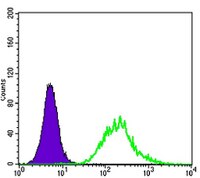MABC682 Sigma-AldrichAnti-MATK Antibody, clone 9D7
Detect Megakaryocyte-associated tyrosine-protein kinase using this mouse monoclonal antibody, Anti-MATK Antibody, clone 9D7 validated for use in western blotting & Flow Cytometry.
More>> Detect Megakaryocyte-associated tyrosine-protein kinase using this mouse monoclonal antibody, Anti-MATK Antibody, clone 9D7 validated for use in western blotting & Flow Cytometry. Less<<Recommended Products
개요
| Replacement Information |
|---|
주요 사양표
| Species Reactivity | Key Applications | Host | Format | Antibody Type |
|---|---|---|---|---|
| H | WB, FC | M | Ascites | Monoclonal Antibody |
| References |
|---|
| Product Information | |
|---|---|
| Format | Ascites |
| Control |
|
| Presentation | Purified mouse monoclonal liquid in PBS containing up to 0.1% sodium azide and 50% glycerol. |
| Quality Level | MQ100 |
| Physicochemical Information |
|---|
| Dimensions |
|---|
| Materials Information |
|---|
| Toxicological Information |
|---|
| Safety Information according to GHS |
|---|
| Safety Information |
|---|
| Packaging Information | |
|---|---|
| Material Size | 100 µL |
| Transport Information |
|---|
| Supplemental Information |
|---|
| Specifications |
|---|
| Global Trade Item Number | |
|---|---|
| 카탈로그 번호 | GTIN |
| MABC682 | 04053252920516 |
Documentation
Anti-MATK Antibody, clone 9D7 MSDS
| 타이틀 |
|---|
Anti-MATK Antibody, clone 9D7 Certificates of Analysis
| Title | Lot Number |
|---|---|
| Anti-MATK, clone 9D7 | VP1407031 |
| Anti-MATK, clone 9D7 - QVP1306175 | QVP1306175 |
| Anti-MATK, clone 9D7 - VP2407241 | VP2407241 |








